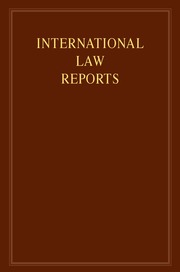Article contents
Delimitation of the Continental Shelf (United Kingdom of Great Britain and Northern Ireland and the French Republic)
Published online by Cambridge University Press: 01 January 2021
Abstract
Sources — Customary international law — Equity and equitable principles — Ex aequo et bono distinguished — Equity within the law — Delimitation of the continental shelf — Relevant factors
State territory — Parts of — Boundaries — Water boundaries — Boundary of continental shelf — Delimitation between opposite States — Equitable principles — Equidistance — Islands — Variable weight of — Geneva Convention on the Continental Shelf 1958, Article 6
State territory — Parts of — Territorial waters — Delimitation — Baselines — Whether rocks covered only at high water equinoctial springs are islands or low — tide elevations — Practice of the parties — Eddystone Rock
Treaties — Operation of — Reservations — Refusal by one party to accept reservations of another — Whether affecting treaty as a whole or only provisions to which reservation relates — Effect of express treaty provision covering reservations — Intention of State making the reservation — Interpretation of reservations — Distinction between a reservation and an interpretation — Geneva Convention on the Continental Shelf 1958, Articles 6 and 12
Arbitration — Procedure — Competence to determine jurisdiction — Delimitation of continental shelf — Whether extending to areas within territorial sea of parties
State territory — Parts of — Continental shelf — Extent of Boundaries — Delimitation — Opposite and adjacent States — Equitable principles — Relation to concepts of equidistance and of median line — Special circumstances — Geographical and geological considerations — Proportionality — Proximity — Natural prolongation — Islands — Whether generating their own shelves — The Channel Islands — Eddystone Rocks — The Scilly Islands — Ushant — Whether full weight to be given to them — Effect of geological features — The Hurd Deep — Position of States not parties to the arbitration
- Type
- Case Report
- Information
- Copyright
- © Cambridge University Press 1979
- 1
- Cited by


